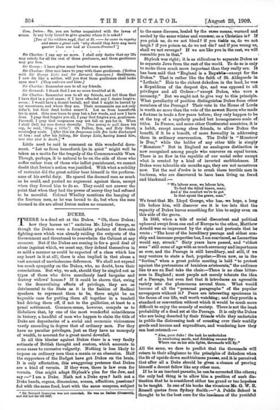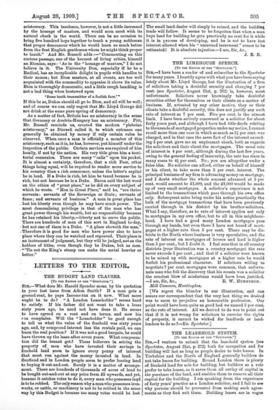DUKES.
THERE is a dead set at the Dukes. "Oh, these Dukes;
how they harass us 1" exclaims Mr. Lloyd George, as though the Dukes were a formidable phalanx of first-rate fighting-men which was already raiding the outposts of the Government and threatened to overwhelm the Cabinet at any moment. But if the Dukes are coming in for a good deal of abuse (against which, we must say, they defend themselves in as mild a manner as could be expected of a class which has any heart in it at all), there is also implied in that abuse a vast amount of unwholesome deference. We shall not expend too much sympathy on the Dukes, who, no doubt, have their consolations. But why, we ask, should they be singled out as types of those who drive mercilessly hard bargains and destroy widows' houses ? If it could be shown that, owing to the demoralising effects of privilege, they are as detrimental to the State as it is the fashion of Radical speakers to represent them to be, there might be an Jarguable case for putting them all together in a tumbril land driving them off, if not to the guillotine, at least to a renal settlement. Common-sense, however, compels us to disbelieve that, by one of the most wonderful coincidences in history, a handful of men who happen to claim the title of Duke are depositaries of a social and economic viciousness vastly exceeding in degree that of ordinary men. For they have no peculiar privileges, just as they have no monopoly of wealth, to account for a great moral downfall.
In all this bluster against Dukes there is a very faulty estimate of British thought and custom, which amounts in some cases to excessive vulgarity. Nothing is less likely to impose on ordinary men than a mania or an obsession. Half the supporters of the Budget have got Dukes on the brain. It is only affectation, this swaggering pretence that Dukes are a kind of vermin. If they were, there is law even for vermin. One might adapt Shylock's plea for the Jew, and say :—" I am a Duke. Hath not a Duke eyes P hath not a Duke hands, organs, dimensions, senses, affections, passions ? fed with the same food, hurt with the same weapons, subject
• Sir Bernard Gasooyne was not executed. He was an Italian (Gusiaeoni), and did not die till 1687. to the same diseases, healed by the same means, warmed and eisoled by the same winter and eummer,as a Christian is P If you prick us, do we not bleed ? if you tiokle -as, do we not laugh ? if you poison us, do we not die ? and if you wrong us, shall we not revenge? If we are like you in the rest, we will resemble you in that."
Shylock was right; it is as ridiculous to separate Dukes as to separate Jews from the rest of the world. To do so is only to make them much more important than they really are. It has been said that "England is a Repablie—except for the Dukes." That is rather like the faith of St. .Aldegonde in " Lothair." Heir to the richest dukedom in the land, he was a Republican of the deepest dye, and was opposed to all privileges and all Orders—" except Dukes, who were a necessity." But we ought not to give way to this principle. What peculiarity of position distinguishes Dukes from other members of the Peerage ? Their vote in the House of Lords is worth no more than the vote of the newest Baron who made a fortune in trade a few years before; they only happen to be at the top of a regularly graded but homogeneous scale of titles. In France, and some other Continental countries, it is a habit, except among close friends, to allow Dukes the benefit, if it be a benefit, of more formality in addressing them in ordinary conversation. The Duke's is " Monsieur le Due," while the holder of any other title is simply "Monsieur." But in England no analogous distinction is now recognised among people who converse on equal terms. There is no flaw in the republic of our social order except what is created by a kind of inverted snobbishness. If Dukes were tolerable six months ago, they are not monstrous now. Yet the mot d'ordre is to crush these terrible men in buckram, who are discovered to have been living on fraud and blackmail :— " We labour soon, we labour late, To feed the titled knave, man; And a' the comfort we're to get Is that ayont the grave, man."
We trust that Mr. Lloyd George, who has,. we hope, a long life before him, will discover ere it is too -late that the
rapacity of Dukes leaves something for him to enjoy even on this side of the grave.
In 1848, when a tide of social discontent and political upheaval swept from one end of Europe to the other, Matthew Arnold was so impressed by the signs and portents that he wrote : "The hour of the hereditary peerage and eldest son ship and immense properties has, I am convinced, as Lamartine would say, struck." Sixty years have passed, and "eldest Sons" still come of age with as much ceremony and importance as ever, and the Peerage is still hereditary, and still, if we may venture to state a fact, popular.—Even now, as in the "forties," when a great public meeting is held "to protest against the pretensions of brainless aristocrats," the audience like to see an Earl take the chair.—There is no class bitter- ness in England ; most people not merely tolerate the idea of a Peerage, but even feel that it introduces an agreeable variety into the phenomena around them. What would become of all the "personal paragraphs" of the popular newspapers without it ? Peers are interesting specimens in the fauna of our life, well worth watching; and they provide a
standard or convention without which it would be much more difficult to enjoy the comedy of society. There is not the least probability of a dead set at the Peerage. It is only the Dukes who are being deserted by their friends while they undertake in public the distressing task of counting over their worldly
goods and income and expenditure, and -wondering how they can best retrench :— "Alas, poor duke ! the task he imdertakes
Is numbering sands, and drinking oeeana drys
Where one on his aide fights, thousands-will fly."
All the same, we dare to predict that the thousands will return to their allegiance to the principles of dukedom when the fit of upside-down snobbishness passes, and it is perceived
that after all a Duke should be given a chance of proving himself a decent fellow like any other man.
If he is an insolent parasite, he can be corrected lilae others; the only bad thing is to allow him a position of such dis- tinction that he is considered either too grand or too hopeless to be taught. In one of his books the vivacious Mr. G. W. B. Russell quotes from Sydney Smith:—" A Public School is thought to be the best cure for the insolence of the youthful
aristocracy. This insolence, however, is not a little increased by the homage of masters, and would soon meet with its natural check in the world. There can be no occasion to bring five hundred boys together to teach a young nobleman that proper demeanour which he would learn so much better from the first English gentleman whom he might think proper to insult." And Mr. Russell adds :—" Commenting on this curious passage, one of the keenest of living critics, himself an Etonian, says : 'As to the "homage of masters," I do not believe in it. The University Don, especially if he be a Radical, has an inexplicable delight in pupils with handles to their names; but Eton masters, at all events, are too well acquainted with the commodity to appraise it above its value. Eton is thoroughly democratic, and a little rough handling is not a bad thing when bestowed upon 'Some tenth transmitter of a foolish face.'" If this be so, Dukes should all go to Eton, and all will be well; and of course we can only regret that Mr. Lloyd George did not drink at the same pure spring of democracy.
As a matter of fact, Britain has no aristocracy in the sense that Germany or Austria-Hungary has an aristocracy. Pitt, Mr. Russell reminds us, created the modern "plebeian aristocracy," as Disraeli called it, to which entrance can generally be obtained by money if only certain rules be observed. When once a man is officially a member of this aristocracy, such as it is, he has, however, put himself under the inspection of the public. Certain services are required of him locally, if not by the nation. His very title gives him a terri- torial connexion. There are many " calls " upon his pocket. It is almost a certainty, therefore, that a rich Peer, other things being equal, will be required to render more service to his country than a rich commoner, unless the latter's capital be in land. If a Duke is rich, let him be taxed because he is rich, but not because he is a Duke. Bacon said the last word on the ethics of "great place," as he did on every subject of which he wrote. "Men in Great Place," said he, "are thrice servants : servants of the Sovereign or State ; servants of fame; and servants of business." A man in great place has lost his liberty even though he may have much power. The most demoralising privilege is that of the man who has great power through his wealth, but no responsibility because • he has retained his liberty,—liberty not to serve the public. There are hundreds of men of this sort in England to-day, • but not one of them is a Duke. "A place sheweth the man." Therefore it is good for men who have power also to have place where they can be watched and reproved. Their place is • an instrument of judgment, but they will be judged, not as the . holders of titles, even though they be Dukes, but as men. " 'Tis not the King's stamp can make the metal heavier or better."







































 Previous page
Previous page